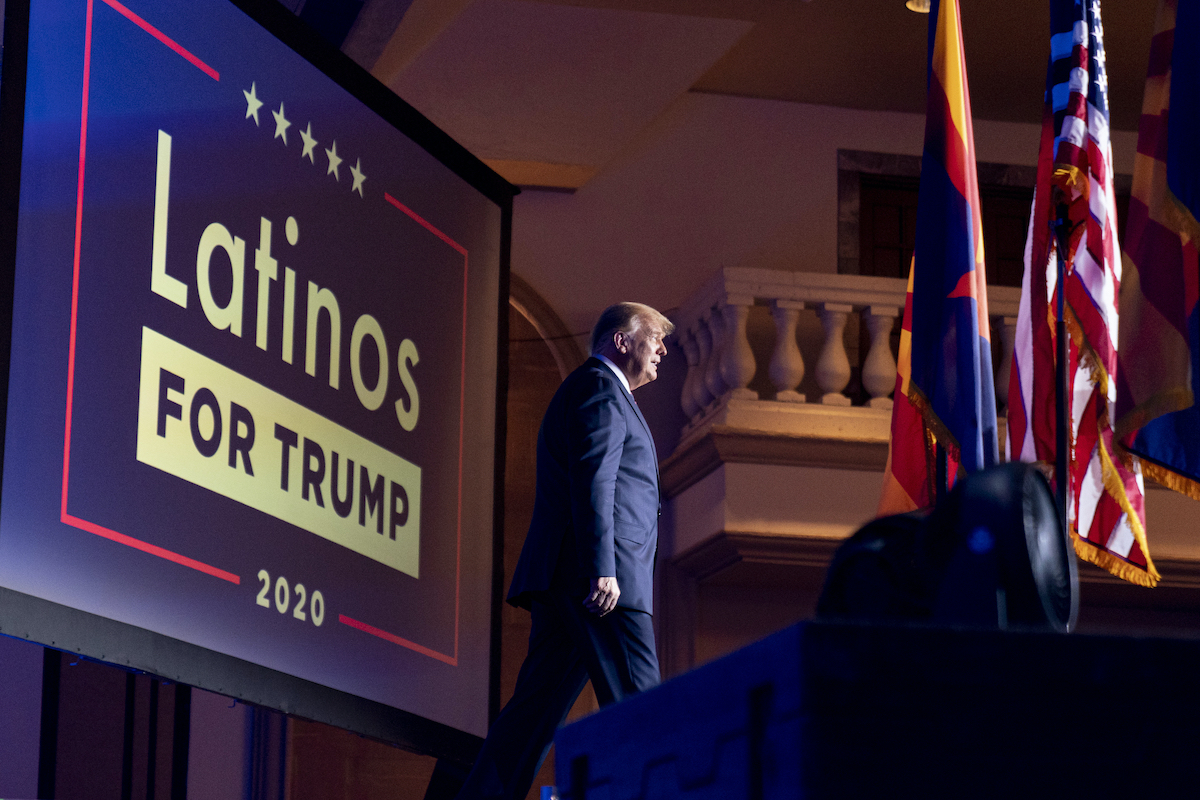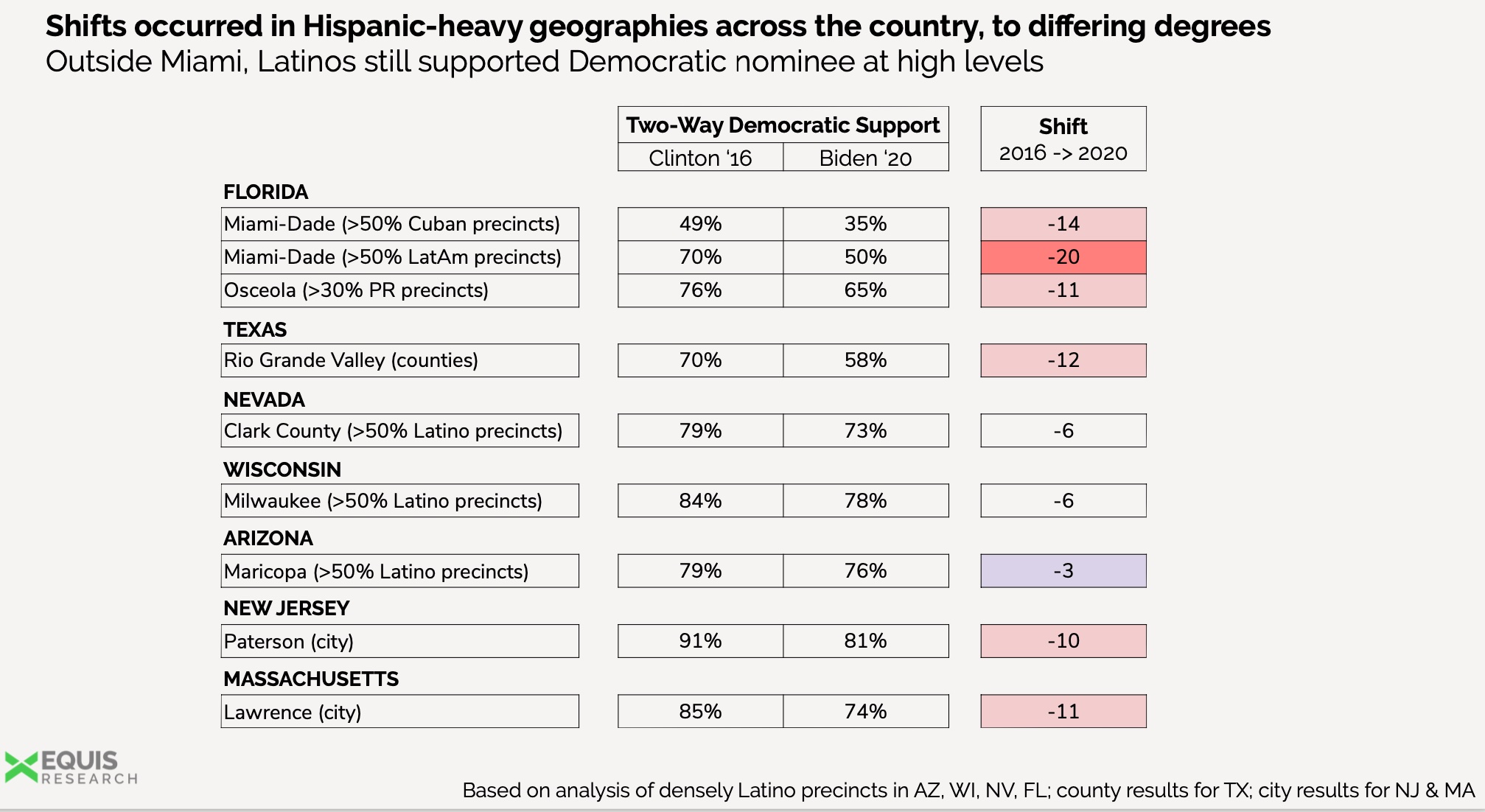

In this September 14, 2020 file photo, President Donald Trump arrives for a Latinos for Trump Coalition roundtable at Arizona Grand Resort & Spa in Phoenix. (AP Photo/Andrew Harnik, File)
On Friday morning, political research company Equis shared with Latino Rebels an extensive 63-page analysis of the 2020 Latino electorate that is one of the more detailed and comprehensive postmortem studies about what is still a very misunderstood group of voters.
News of the study’s publication was first reported by Axios’ Jonathan Swan, who noted that the data in the study “that the coronavirus pandemic may have helped drive former President Donald Trump’s surprising increase in support from Latinos last November.”
While the Equis analysis does cover the issue of Trump’s Latino support, it also dives deeply into other takeaways that confirm what many observers of Latino voters have been saying for years—the growing Latino electorate, which experienced a historic turnout last year, is still very persuadable because there is very little overall outreach investment in the community.
“We saw Latino voters on the margins of the overall electorate. They are harder to reach, they are harder to poll and they are easier to ignore,” Carlos Odio, co-founder of Equis Labs, told Latino Rebels. “There are lessons even for us to dig deeper and look at other layers, getting to voters who are seen as invisible become more visible in the data.”
Some of the key data takeaways from the study include the following:
- The 2020 elections were a reminder of the diversity —including ideological diversity— of Latino voters. The results of 2020 challenge some facile assumptions about the Latino vote, and speak to the dangers of taking an overly simplistic view of any demographic group in the electorate.
- Latinos were a critical part of the Democratic coalition that won the WH & Senate. There are several states that Joe Biden and Senate Democrats won with the help of Latino voters, and there are none they lost because of them.
- Still, Trump & the GOP actively campaigned for the Latino vote and made gains that cut across geography & place of origin. In South Florida, the gains were enough to flip congressional seats. But questions remain about the nature of the shift, which will take yet more time to unpack.
- In 2020, a segment of Latino voters demonstrated that they are more “swing” than commonly assumed.
- Trump appeared to make gains in the last year of his term among voters usually on the sidelines of politics. While Latinos are often treated as a target for registration and turnout, it was less-frequent Hispanic voters who showed the most “swing.”
- This is a story of turnout and persuasion. Some analysis makes the mistake of treating the Hispanic electorate as static from election to election, when in fact it is incredibly dynamic and fast-changing. The Trump coalition of Hispanic voters, still dwarfed in size by the Democratic coalition, grew on the margins thanks to a combination of defections and new voters, with likely a greater number of the latter.
- While the “why” of this shift requires more investigation, part of the story appears to be that the barrier keeping some conservative Latinos from voting for Trump went down during COVID, with a change in focus from his anti-Latino or anti-immigrant positions to other concerns, including the economy.
“Many observers of the Latino electorate have always been talking for years about the potential volatility about of Latino voters,” said Odio, who along with Equis co-founder Stephanie Valencia, is a former member of the Obama administration. “What caught people by surprise in 2020 is seeing that swing happening in real life. There is part of the Latino electorate that is more persuadable than we assume, and if Republicans make the effort to reach out to these voters, they will find some results. The simplest answer for Democrats is to treat Latino voters like the persuadable voters they are.”
“You got to give Latinos the suburban white voter treatment,” Odio added.
Last November, Odio appeared on Latino Rebels Radio and discussed many of the questions Equis was beginning to explore as part of a 2020 postmortem.
The basis of this new Equis study involved more than 40,000 interviews with Latino voters across 12 states. The study confirmed what other studies have already concluded: that the Biden-Harris ticket won about two-thirds of Latino voters nationally, although Trump-Pence did see 202o Latino precinct shifts in states like Nevada, Texas, Florida, Wisconsin, Arizona, New Jersey and even liberal bastion Massachusetts.


This is the complete Equis analysis:
***
Julio Ricardo Varela is founder and publisher of Latino Rebels, part of Futuro Media. He tweets from @julito77.



[…] with Boston Globe columnist Marcela García about one of her latest columns, which takes a look at the latest Equis Research study about the Latinx vote in this last election cycle. It was such an honor to have such an esteemed […]
[…] political shift occurred particularly in the Texas border region. In the 14 border counties that Biden won, Trump gained a considerable portion of the vote, ranging […]
[…] D.C. — Donald Trump overperformed with Latino voters during the 2020 election. Nearly one in three voted for his reelection last year, alarming Democrats and vindicating […]
[…] this year, a 2020 postmortem by Equis Labs concluded that the growing U.S. Latino electorate, which experienced a historic […]